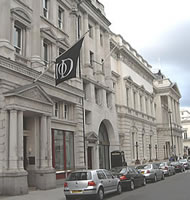Study, work or travel in the UK. British
culture and life.


Course
/ MBA
MBA programmes in the UK and elsewhere
|
|
Study, work or travel in the UK. British
culture and life.
|
|
||
|
|
|
|
||
 |
||||
|
|
|
|
||
 |
||||
|
Course
/ MBA
|
||||
|
MBA programmes in the UK and elsewhere
|
||||
|
Sections:
|
Introduction |
 |
| Choosing an MBA course | ||
| Applying | ||
| Business journals | ||
| Links | ||
|
Related pages:
|
Guide (information for all types of student) | |
| Postgraduate study (MA, MSc, PhD) |
 London Business School |
 Judge Institute, Cambridge |
 The Institute of Directors |
 A stall at one of the MBA Fairs |
 The Business Design Centre |
 |
Official
MBA Handbook Author: The Association of MBAs Publisher: Financial Times Prentice Hall |
 |
Which
MBA? Author: George Bickerstaffe Publisher: FT Prentice Hall Date: October 2007 |
 |
Cracking
the GMAT 2012 (or: Cracking
the GMAT 2011) Authors: Geoff Martz, Adam Robinson Publisher: Princeton Review Date: June 2011 |
 |
Kaplan
GMAT 2011: Premier Program Publisher: Simon & Schuster International Date: July 2010 |
 |
The
Economist (weekly magazine) (Magazine's website: http://www.economist.com) |
||
 |
Business
Week (weekly magazine) (Magazine's website: http://www.businessweek.com) |
 |
Harvard
Business Review (monthly magazine) (Magazine's website: http://www.hbr.org) |
|
|
|